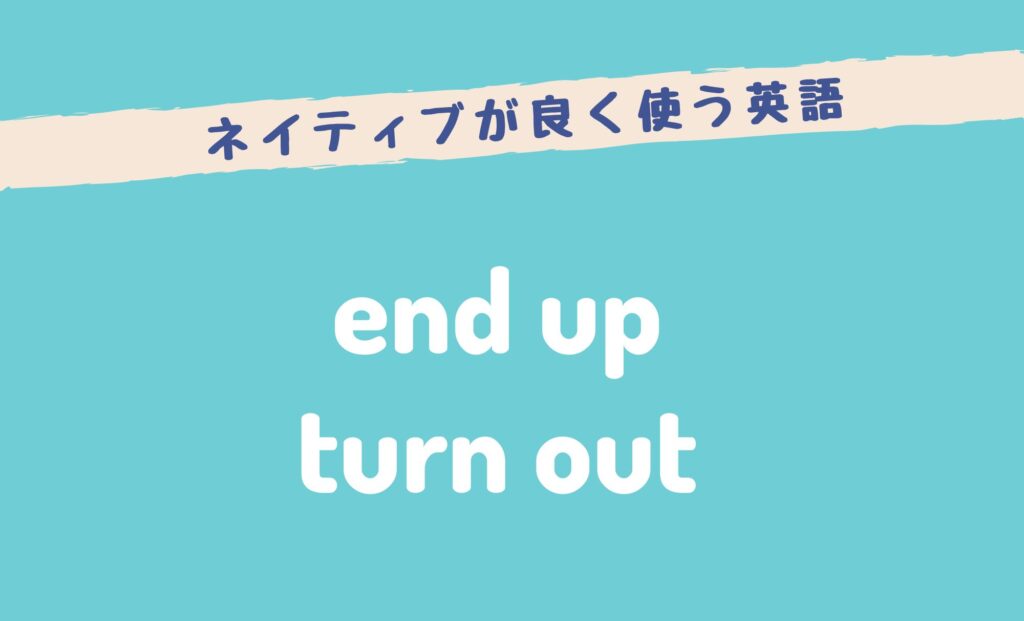ネイティヴが良く使う英語「end up」「turn out」
2024.10.05
- お茶の水校
- 千葉校
- 武蔵小杉校
- 船橋校
- 英語学習ブログ

今回はネイティブが会話でよく使う“end up”と“turn out”、このよく似た2つの表現を見ていきたいと思います!
結果を表す表現なので、主に過去形で「結局〜した」「結果的に〜だった」などと言う時に使います。どちらも意味は殆ど一緒ですが、使い方が少し異なるので気をつけましょう。
✔end up
結果〜する、結局〜する、最終的に〜する
[someone/something] ended up 動名詞(-ing)→[人/モノが]結果/結局〜した
の形でよく使われます。
例:I was on a diet and exercising everyday, so I ended up losing weight.
(食事制限して、毎日運動もしてたんだ。そしたら体重減ったよ。)
例:I ended up staying at home yesterday because of the bad weather.
(昨日は天気悪かったから、結局家にいたよ。)
例:My husband and I went to the phone shop yesterday and it was so crowded that we ended up waiting for two hours.
(昨日夫と携帯ショップに行ったんだけど、混んでて、結局2時間も待ったよ。)
例: Did she end up quitting her job?
(彼女結局仕事やめたの?)
(食事制限して、毎日運動もしてたんだ。そしたら体重減ったよ。)
例:I ended up staying at home yesterday because of the bad weather.
(昨日は天気悪かったから、結局家にいたよ。)
例:My husband and I went to the phone shop yesterday and it was so crowded that we ended up waiting for two hours.
(昨日夫と携帯ショップに行ったんだけど、混んでて、結局2時間も待ったよ。)
例: Did she end up quitting her job?
(彼女結局仕事やめたの?)
✔turn out
結果〜になる、結局〜になる、〜だとわかる
[something] turned out to be 名詞/turned out 形容詞→[何かが]結果/結局~になった
it turns out (that) 文章→ ~だとわかる
などの形でよく使われます。
例:I thought it was going to rain, but it turned out to be a beautiful day.
(雨降ると思ったけど、結果的にすごくいい天気だった。)
例:Because I used too much salt, the cake turned out really bad.
(塩を入れすぎて、ケーキがめっちゃまずくなった。)
例:Despite its low budget, the film turned out to be a huge box office success.
(低予算にもかかわらず、その映画は興行的に大成功をおさめた。)
例:A new guy started yesterday and it turns out we went to the same high school.
(新しい男の人が昨日入ってきたんだけど、私と同じ高校だったことが判明したんだ。)
(雨降ると思ったけど、結果的にすごくいい天気だった。)
例:Because I used too much salt, the cake turned out really bad.
(塩を入れすぎて、ケーキがめっちゃまずくなった。)
例:Despite its low budget, the film turned out to be a huge box office success.
(低予算にもかかわらず、その映画は興行的に大成功をおさめた。)
例:A new guy started yesterday and it turns out we went to the same high school.
(新しい男の人が昨日入ってきたんだけど、私と同じ高校だったことが判明したんだ。)